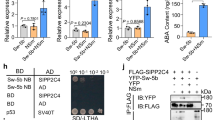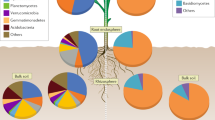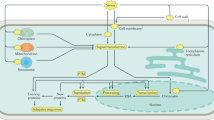Abstract
CACAO plants (Theobroma cacao) infected with Marasmius perniciosus produce excessive and abnormal branching, a condition known as witch broom disease. It has been suggested by Brian1 that symptoms may be caused by the production of growth-stimulatory or auxin-like substances by the pathogen. The morphological effects of gibberellic acid sprayed on cacao seedlings suggested that the ‘brooming’ effect of M. perniciosus might be caused by the production in vivo of gibberellin-like compounds by the fungus (Nichols, unpublished data).
This is a preview of subscription content, access via your institution
Access options
Subscribe to this journal
Receive 51 print issues and online access
$199.00 per year
only $3.90 per issue
Buy this article
- Purchase on Springer Link
- Instant access to full article PDF
Prices may be subject to local taxes which are calculated during checkout
Similar content being viewed by others
References
Brian, P. W., Symp. Soc. Exp. Biol., 11, 166 (1957).
Author information
Authors and Affiliations
Rights and permissions
About this article
Cite this article
DUDMAN, W., NICHOLS, R. Absence of Gibberellin-like Substances in Filtrates of Marasmius perniciosus Stahel (Witch Broom Disease of Cacao). Nature 183, 899–900 (1959). https://doi.org/10.1038/183899a0
Issue Date:
DOI: https://doi.org/10.1038/183899a0
Comments
By submitting a comment you agree to abide by our Terms and Community Guidelines. If you find something abusive or that does not comply with our terms or guidelines please flag it as inappropriate.



